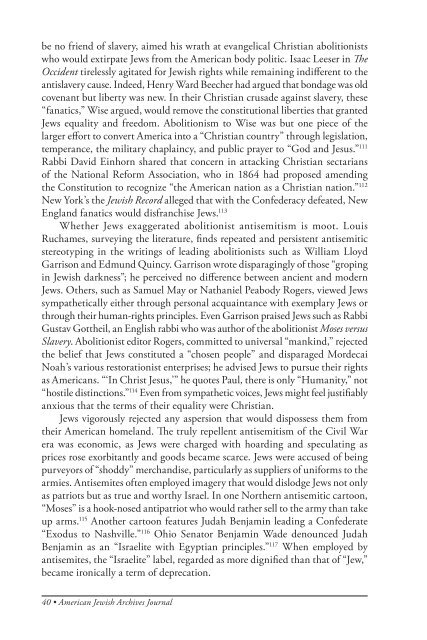American Jewish Archives Journal, Volume 64, Numbers 1 & 2
American Jewish Archives Journal, Volume 64, Numbers 1 & 2
American Jewish Archives Journal, Volume 64, Numbers 1 & 2
You also want an ePaper? Increase the reach of your titles
YUMPU automatically turns print PDFs into web optimized ePapers that Google loves.
e no friend of slavery, aimed his wrath at evangelical Christian abolitionists<br />
who would extirpate Jews from the <strong>American</strong> body politic. Isaac Leeser in The<br />
Occident tirelessly agitated for <strong>Jewish</strong> rights while remaining indifferent to the<br />
antislavery cause. Indeed, Henry Ward Beecher had argued that bondage was old<br />
covenant but liberty was new. In their Christian crusade against slavery, these<br />
“fanatics,” Wise argued, would remove the constitutional liberties that granted<br />
Jews equality and freedom. Abolitionism to Wise was but one piece of the<br />
larger effort to convert America into a “Christian country” through legislation,<br />
temperance, the military chaplaincy, and public prayer to “God and Jesus.” 111<br />
Rabbi David Einhorn shared that concern in attacking Christian sectarians<br />
of the National Reform Association, who in 18<strong>64</strong> had proposed amending<br />
the Constitution to recognize “the <strong>American</strong> nation as a Christian nation.” 112<br />
New York’s the <strong>Jewish</strong> Record alleged that with the Confederacy defeated, New<br />
England fanatics would disfranchise Jews. 113<br />
Whether Jews exaggerated abolitionist antisemitism is moot. Louis<br />
Ruchames, surveying the literature, finds repeated and persistent antisemitic<br />
stereotyping in the writings of leading abolitionists such as William Lloyd<br />
Garrison and Edmund Quincy. Garrison wrote disparagingly of those “groping<br />
in <strong>Jewish</strong> darkness”; he perceived no difference between ancient and modern<br />
Jews. Others, such as Samuel May or Nathaniel Peabody Rogers, viewed Jews<br />
sympathetically either through personal acquaintance with exemplary Jews or<br />
through their human-rights principles. Even Garrison praised Jews such as Rabbi<br />
Gustav Gottheil, an English rabbi who was author of the abolitionist Moses versus<br />
Slavery. Abolitionist editor Rogers, committed to universal “mankind,” rejected<br />
the belief that Jews constituted a “chosen people” and disparaged Mordecai<br />
Noah’s various restorationist enterprises; he advised Jews to pursue their rights<br />
as <strong>American</strong>s. “‘In Christ Jesus,’” he quotes Paul, there is only “Humanity,” not<br />
“hostile distinctions.” 114 Even from sympathetic voices, Jews might feel justifiably<br />
anxious that the terms of their equality were Christian.<br />
Jews vigorously rejected any aspersion that would dispossess them from<br />
their <strong>American</strong> homeland. The truly repellent antisemitism of the Civil War<br />
era was economic, as Jews were charged with hoarding and speculating as<br />
prices rose exorbitantly and goods became scarce. Jews were accused of being<br />
purveyors of “shoddy” merchandise, particularly as suppliers of uniforms to the<br />
armies. Antisemites often employed imagery that would dislodge Jews not only<br />
as patriots but as true and worthy Israel. In one Northern antisemitic cartoon,<br />
“Moses” is a hook-nosed antipatriot who would rather sell to the army than take<br />
up arms. 115 Another cartoon features Judah Benjamin leading a Confederate<br />
“Exodus to Nashville.” 116 Ohio Senator Benjamin Wade denounced Judah<br />
Benjamin as an “Israelite with Egyptian principles.” 117 When employed by<br />
antisemites, the “Israelite” label, regarded as more dignified than that of “Jew,”<br />
became ironically a term of deprecation.<br />
40 • <strong>American</strong> <strong>Jewish</strong> <strong>Archives</strong> <strong>Journal</strong>
















